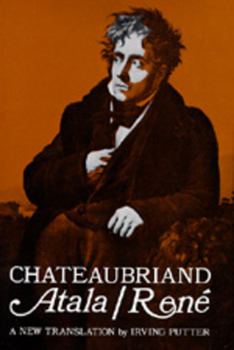Atala and Rene
Select Format
Select Condition 
Book Overview
Chateaubriand was the giant of French literature in the early nineteenth century. Drawing on eighteenth-century English romanticists, on explorers in America, and on Goethe's Werther, he had a profound effect on French writers from Victor Hugo and Lamartine to George Sand and Flaubert. A quixotic and paradoxical personality, he combined impressive careers as a brilliant prose-poet, a spiritual guide, a high-ranking diplomat, and an enterprising lover...
Format:Paperback
Language:English
ISBN:0520002237
ISBN13:9780520002234
Release Date:January 1952
Publisher:University of California Press
Length:128 Pages
Weight:0.38 lbs.
Dimensions:0.3" x 5.5" x 8.2"
Customer Reviews
2 ratings
"Toward a new world of artistic prose"
Published by Thriftbooks.com User , 15 years ago
This is a review of Rene, perhaps some other time I'll read Atala. I came to this book through reading Nabokov's commentary to Eugene Onegin. Nabokov called Rene "a work of genius by the greatest French writer of his time. . . this admirable short novel whose art and charme veloute only Senacour's Oberman can approach . . . The rhythm and richness of phrasing are admirable. Flaubert could not have done better." Even the title page of the larger work, Genie du Christianisme, of which Rene is a part, is judged "sonorous" by Nabokov. Not much to say after that. I am lucky to have a comfortable, copious UC library just across town where undeservedly obscure books like this can be easily found. The story is but 29 pages long, its title character a forerunner of the Byronic hero. The book beautifully expresses a romantic spirit and there are several reasons for that. The turmoil of Rene's heart leading him to solitude. The search for what life has to offer. The tender love between brother and sister. Of course there's Chateaubriand's use of apostrophe, "With what reverent and poetic awe I wandered through those vast edifices consecrated to religion by the arts! . . . How beautiful are the echoes circling round those domes like rolling waves in the ocean, like the murmur of winds in the forest or the voice of God in his temple!" And there is the framing of the scene in nature like Rene telling his secret, the story of his heart, from under the bright green leaves of a sassafras tree where he can see the grandeur of both the Mississippi River and the Appalachians (poetic geographic license). If only I knew French then I could hear the sound of romance too and then be able to judge this a prose poem for myself. Alas, life is too short.
Rene by Chateaubriand
Published by Thriftbooks.com User , 22 years ago
A powerful tale of love, isolation and loss in post-revolutionary France. The author narrates the tale of Rene, a young man isolated from his family by early tragedy and from a social mileu by his 'mal de siecle'. We are first introduced to Rene, living on an Indian Reservation in America, far from home, as he is pressed by some companions to explain what events in his life have brought hime to choose such a life of solitude and wilderness. We learn of Renes mostly unhappy upbringing and see him travel the world in search of some unknown solution to his lack of belonging or purpose in life. The only person in his life he is able to love and feel close to is his sister Amelie. The only periods of happiness in his life, in fact, have been those spent with his sister.But Amelie hides a terrible secret which is gradually destroying her - feelings of incestuous love for her brother. The plot builds to a tense and dramatic climax when Amelie confesses to her "criminelle passion" and is overheard by Rene. She finds solice in the church, becomes a nun and is lost to the outside world, and Rene, forever. Desperate without the only comfort and stabilising influence in his life, and shocked by his sisters revelation, Rene abandons the comforts of civilized society and retreats to America.The book contains an personal insite into the effect of the revolution on an individual member of the aristocracy, as well as the timeless personal struggles of love and family.Although the book contains several parallels between René's life and Chateaubriand's (Chateaubriand tried to commit suicide at 18, travelled to North America and was very close to his sister) the book is much more than merely an autobiographical tale.At the time the book was written, René expressed the popular feeling in France and the character was a hero - `The young man ill at ease.'`René' was written as a moralising tale to show the dangers of not following the Christian faith - Amelie dies happy, having found the church but René doesn't find happiness or faith. (Napoleon had at the time signed a pact with the pope to increase Catholicism in France.) However readers did not understand this message, but saw René as rejecting society. The character came to represent the `mal du siecle' - a search for meaning and identity. The book symbolised a sense of displacement, alienation, uncertainty and longing.






